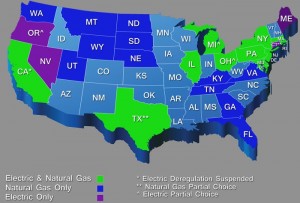
On January 1, 2002, SB 7 became law and deregulated electricity in Texas. Since deregulation in Texas took effect, about 40 percent of Texas homes and 85 percent of Texas businesses have switched electricity suppliers at least once, according to ElectricityTexas.com.
In 2006, I left the wholesale side of the electricity market and joined an energy consulting firm that focused on negotiating electric and natural gas rates for commercial and industrial customers in deregulated markets. I remember during the summer of 2006, my aunt, a longtime Houstonian, was complaining about her power bill. She knew that she kept her house colder than the average person, so that Austin, her Great Pyrenees would be comfortable, but she just felt she was paying too much for power. So I asked her, why don’t you shop around and switch to a more competitive rate with a different supplier?
She knew Texas was deregulated, but she didn’t think anyone really switched providers for their house. After our conversation, she asked all of her neighbors who supplied their power and each one used a different supplier! I recommended she visit www.powertochoose.org, which is a great website to verify if you are eligible to switch and will compare offers from different suppliers and for different terms. Not all of Texas is deregulated. If you are served by a municipality or utility cooperative, you are not eligible to switch. Since 2006, my aunt has used three different suppliers, my brother has used three different suppliers and my parents have used two different suppliers. Each one is able to contract what best fits their needs, whether it is long term budget certainty or flexibility to ride index.

It amazed me that after 4 years of deregulation, residential customers were still unclear about their options. Seven years later, I’m proud that each of my family members is taking advantage of deregulation in Texas, but I often wonder how many residential customers are still paying the POLR rate. Even though each one is now a “pro” at contracting for their electricity, I still receive a phone call or email around contract expiration time asking for my recommendation and I’m happy to give them my view of the market.
The strategy around electric contracting can be very different when you are talking about a business versus someone’s home. When you are contracting your home and it’s coming out of your pocket, are you looking for long term budget certainty or do you try to time the market and lock short term contracts?

